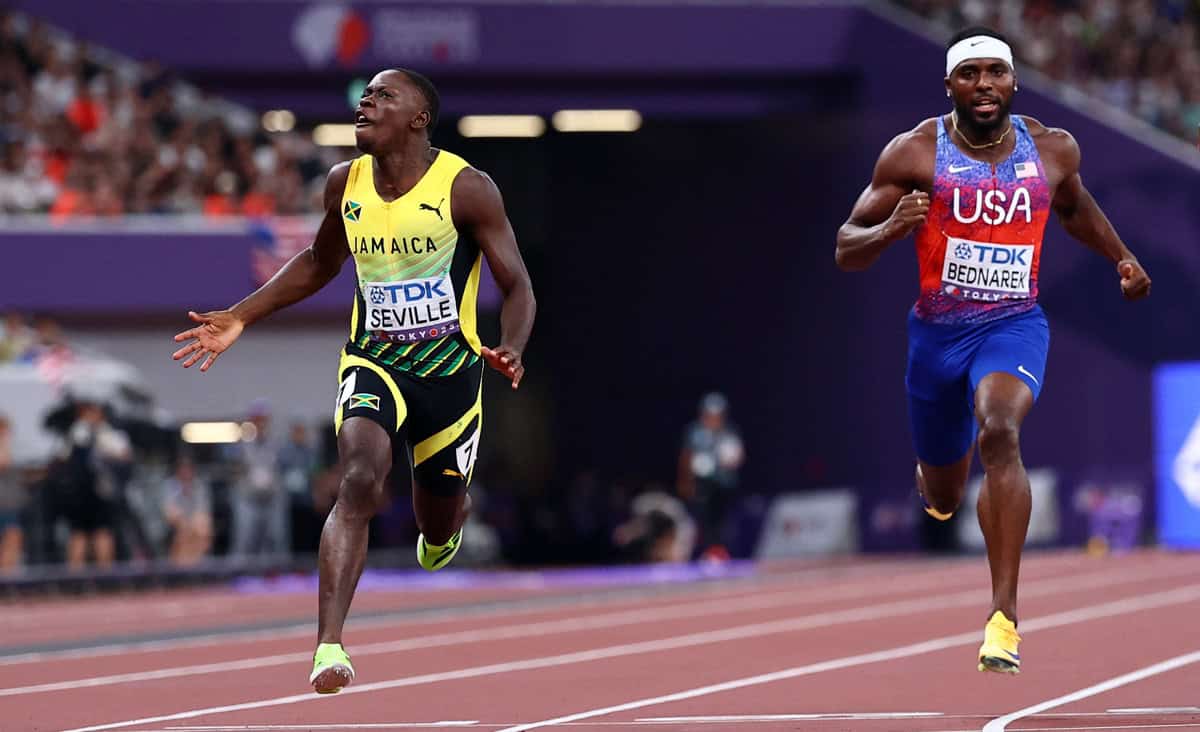When I went to school, oblique lines went off at angles. Sunday night at the Japan National Stadium, Oblique Seville proved the fastest man up the straight on his way to a shock victory in the men’s 100 metres.
It was supposed to be a rematch of the epic Paris Olympic final in which Noah Lyles somehow got his chest to the line ahead of Kishane Thompson’s arms, legs and everything but a part of his torso. Indeed, when the American embraced the Jamaican at the finish line it seemed Thompson may have won.
But their battle was for the silver medal. Oblique Seville, the only medalist to run a personal best, was half a metre across the line when the Paris gold and silver medalists reached it. With Jamaican sprint royalty in Usain Bolt looking on, Seville and Thompson restored the Caribbean nation to the top of world sprinting – for this night anyway.
It was a session for straight line action. Immediately before Lyles v Thompson II, Melissa Jefferson-Wooden underscored her own dominance of 2025 with a championship record 10.61 victory in the women’s race ahead of Jamaica’s Tina Clayton and Olympic champion Julien Alfred. Clayton matched Seville in being the only one of the medalists to run a PB, but not, alas, in winning the race.
If Tokyo25 is to be Shelly-Ann Fraser-Price’s final appearance (she is proving a reluctant retiree to date), she made it a memorable one. She made the final by finishing second to Alfred in the semi and finished fifth in 11.03. Fraser-Pryce has been the queen of Jamaica’s golden reign of sprinting, sitting on the throne alongside King Usain.
Meanwhile, over in the back-straight, there was more straight line action in the women’s long jump. The Olympic champion, Tara Davis-Woodhall, produced a winning 7.13 (and a supporting 7.08), to also become the world champion. Olympic champion Mihaila Mihambo got out to 6.99 but then fouled her final two attempts in straining for the winning distance.
But perhaps the biggest surprise up the final straight – no, make that certainly the biggest – came when Jimmy Gressier squeezed his way through a tight bunch to win the 10,000 metres. In a race blighted somewhat by the hot and humid conditions – it took until the sixth kilometre for a split substantially less than three minutes (15:10.25 for 5000).
It always seemed that someone – anyone – was going to take the race over. Benson Kiplangat tried to goad his Kenyan teammates into action in the sixth kilometre. Salemon Barega tried to motivate his Ethiopian teammates, too, but nothing much changed.
Finally, in the end, Gressier proved the best driver in heavy traffic as he made his way to a memorable victory in 28:55.77. The final lap took just under 54 seconds, the final kilometre 2:26. A race that took a long time to come to life still managed to produce a memorable finish. Yomif Kejelcha took the silver medal and Andreas Almgren made it two out of the three medals in taking the bronze. Two medals out of three for Europe. Can you believe it (thousands couldn’t).
If your correspondent’s late-night, post-race research is accurate, the last Frenchman to take a medal in a world or Olympic 5000 or 10,000 metres was Alain Mimoun behind Emil Zatopek in the Helsinki 1952 Olympics (Mimoun won the marathon, too, in Melbourne four years later). The ‘pops’ you can hear is the sound of champagne corks from the HQ of the French delegation.

So that’s it from day two of the world championships in Tokyo. The weather’s oppressive, the crowd management strategies appear to remain locked in the desk drawer of an administrator who has taken untimely annual leave, but despite it all the first two days of athletics has been thoroughly absorbing and memorable.
More heat, storms on the horizon by the weekend? Bring it on: the athletics just keeps getting better.
